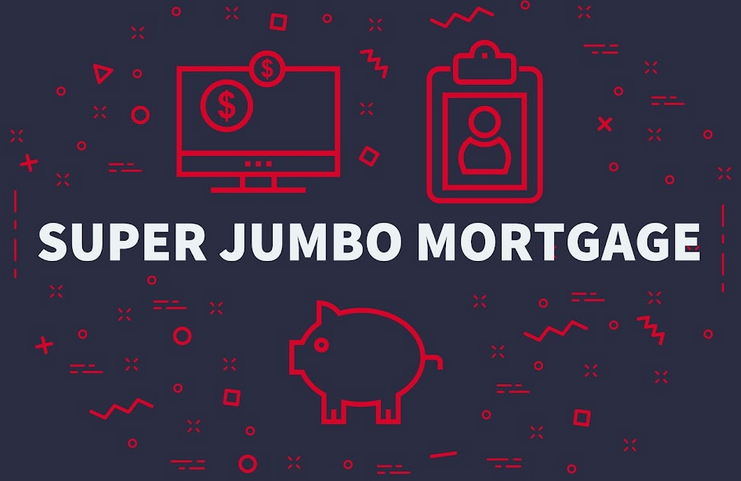In the ever-evolving housing market landscape, a new term has emerged that has captured the attention of both homeowners and aspiring buyers alike: super jumbo mortgages. These financial instruments, capable of financing high-value properties beyond the limits of conventional mortgages, have gained immense popularity in recent years. The necessity for special financing options has become evident, with luxury estates and high-end properties commanding astronomical prices. Therefore, understanding the application process for super jumbo mortgages is crucial for those considering purchasing their dream home.
This blog post aims to shed light on the intricacies of super jumbo mortgages and comprehensively explain the application process. Whether you are a financially astute individual seeking to invest in a high-value property or someone curious about real estate finance, this article will serve as an informative guide. We will cover the key aspects of super jumbo mortgages, from their definition and popularity in the housing market to the step-by-step process of obtaining such a loan. By the end of this article, you will have a solid understanding of what it takes to navigate the intricacies of a super jumbo mortgage and secure financing for your extravagant real estate aspirations. So, let us delve deeper into this fascinating world and demystify the application process for super jumbo mortgages.
What Are Super Jumbo Mortgages?
Traditional mortgages may not offer enough financing to cover the astronomical price tags when purchasing high-value properties. This is where super jumbo mortgages come into play. But what exactly are they?
Super jumbo mortgages are a specialized type of loan that goes beyond the limits of standard mortgages and even jumbo mortgages. While jumbo mortgages are typically defined as loans exceeding the limits set by government-sponsored entities such as Fannie Mae and Freddie Mac, super jumbo mortgages take it further. These loans cater to the needs of affluent borrowers looking to finance luxury estates, high-end properties, and residences in exclusive locations.
The loan limits for super jumbo mortgages vary significantly from conventional and jumbo mortgages. While the specific thresholds can vary based on region and lender, super jumbo mortgages often start at millions of dollars and can go even higher. These loans allow borrowers to access the substantial funds necessary to purchase prestigious properties that may be out of reach for conventional financing options.
Properties financed by super jumbo mortgages are often characterized by their grandeur, luxury, and uniqueness. Luxury mansions, beachfront villas, penthouses in cosmopolitan cities, and expansive estates in coveted neighborhoods are just some properties that may qualify for super jumbo mortgages.
Eligibility Criteria
Obtaining a super jumbo mortgage is not as straightforward as a traditional mortgage. Lenders have stringent eligibility criteria to minimize risk when dealing with high-value loans. Understanding these criteria is essential for potential borrowers.
One vital aspect of eligibility for a super jumbo mortgage is the minimum credit score requirement. While the specific credit score threshold can vary among lenders, a high credit score is typically necessary to qualify for such a loan. In most cases, borrowers need a credit score of at least 700 or higher. Lenders use credit scores to assess an individual’s creditworthiness and determine the level of risk associated with lending such substantial amounts.
Another crucial factor that lenders consider is the debt-to-income ratio (DTI). This ratio measures how much a borrower’s monthly income is allocated towards debt repayments. Lenders typically have lower DTI thresholds for super jumbo mortgages than conventional mortgages. To qualify for a super jumbo mortgage, borrowers should maintain a DTI ratio of around 40% or lower. Having a low DTI indicates to lenders that the borrower has a healthy financial profile and can manage substantial loan payments.
Lenders typically require comprehensive asset and income verification to further evaluate a borrower’s financial stability. This involves scrutinizing bank statements, investment portfolios, and tax returns to verify the borrower’s income and assets. Lenders want assurance that the borrower has the financial means to make the mortgage payments and handle any unexpected expenses that might arise.
Lastly, down payment requirements for super jumbo mortgages are typically higher than conventional mortgages. A substantial down payment is often necessary to secure these high-value loans. While down payment requirements vary among lenders, it is not uncommon for them to range from 20% to 30% of the property value. This requirement acts as a safeguard for lenders. It reduces the loan-to-value ratio, providing additional protection in any potential financial downturns.
The Application Process
Applying for a Super Jumbo Mortgage can seem daunting. Still, with a step-by-step walkthrough, you can easily navigate the process. Here are the various steps involved in the application process:
- Documentation Required
To apply for a Super Jumbo Mortgage, you must provide several documents for income verification, tax returns, and bank statements. Lenders require these documents to assess your financial stability and determine your eligibility for a large loan.
- Property Appraisal And Additional Inspections
In addition to the standard property appraisal, Super Jumbo Mortgages often require additional inspections such as flood certifications or structural evaluations. These inspections ensure that the property meets the necessary requirements and mitigate potential risks for both the lender and the borrower.
Interest Rates And Fees
Understanding the interest rates and fees associated with Super Jumbo Mortgages is crucial. Here’s what you need to know:
- Interest Rates
Super Jumbo Mortgages generally have higher interest rates compared to standard mortgages due to the larger loan amounts. It’s essential to compare rates from different lenders to find the best option that suits your financial goals.
- Fixed-rate vs. Adjustable-rate Options
Super Jumbo Mortgages offers both fixed-rate and adjustable-rate options. Fixed-rate mortgages provide stability with a consistent interest rate throughout the loan term. Adjustable-rate mortgages offer initial lower rates but may fluctuate over time.
- Fees And Closing Costs
Super Jumbo Mortgages often come with higher fees and closing costs due to the complexity and size of the loan. Understanding the breakdown of these expenses and negotiating where possible to minimize costs is crucial.
Lender Selection
Choosing the right lender for your Super Jumbo Mortgage is a critical decision. Consider the following:
- Comparison Of Banks, Credit Unions, And Private Lenders
Explore various options, such as traditional banks, credit unions, or private lenders, to find the best fit for your needs. Each option has its own advantages and disadvantages.
- Shopping Around For The Best Rates And Terms
Take the time to shop around and compare rates and terms from multiple lenders. This ensures you secure the most favorable conditions and potentially save thousands of dollars over the life of your loan.
Approval Process
The approval process for a Super Jumbo Mortgage involves a few important factors:
- Time Frame For Approval
While Super Jumbo Mortgages typically require a more rigorous assessment, the approval process can still vary. Expect a longer timeframe compared to standard mortgages due to the larger loan amounts and more extensive documentation.
- Underwriting Process Explained
During the underwriting process, the lender assesses your eligibility for the Super Jumbo Mortgage by evaluating your financial history, credit score, income, and other factors. This process ensures that both the borrower and lender are protected.
- Factors Impacting Approval Times
Several factors can influence the approval times, including the complexity of the application, the accuracy and completeness of the documentation, and potential additional due diligence required by the lender.
Closing The Loan
As you near the end of the mortgage process, here’s what you should expect:
- Final Steps In The Mortgage Process
The closing process involves the finalization of your Super Jumbo Mortgage. During this stage, the lender may conduct a final review, and you’ll need to sign the necessary paperwork.
- Explanation Of The Closing Process
The closing process typically includes signing various legal documents, paying closing costs, and transferring ownership. You may work with a closing agent or attorney to ensure a smooth and legally compliant closing.
- Post-closing Considerations
After closing, remember to prepare for your first payment and understand any escrow account requirements. It’s essential to budget for these factors appropriately to prevent any surprises.
Risks And Considerations
Before committing to a Super Jumbo Mortgage, it’s crucial to be aware of the potential risks and considerations:
- Potential Risks
Super Jumbo Mortgages come with increased risks, including larger monthly payments, the potential for higher interest rates, and exposure to market fluctuations. Understanding these risks is key to making an informed decision.
- Long-term Financial Commitment
Given their size, Super Jumbo Mortgages represent a substantial long-term financial commitment. Ensure that you thoroughly evaluate your financial situation and consider the impact on your overall financial goals before proceeding.
- Strategies For Risk Mitigation
Mitigating risk involves maintaining an emergency fund, having a solid understanding of your monthly cash flow, and carefully assessing the stability of your income sources. Consulting with a financial advisor can also provide valuable guidance on risk management.
Conclusion
Applying for a Super Jumbo Mortgage requires careful consideration and understanding of the application process, interest rates, fees, lender selection, approval process, closing the loan, as well as the associated risks and considerations. By following this comprehensive guide, you’ll be well-equipped to confidently make informed decisions and navigate the Super Jumbo Mortgage application process. Remember to always seek professional advice when needed, and good luck on your homeownership journey.
Related Posts












